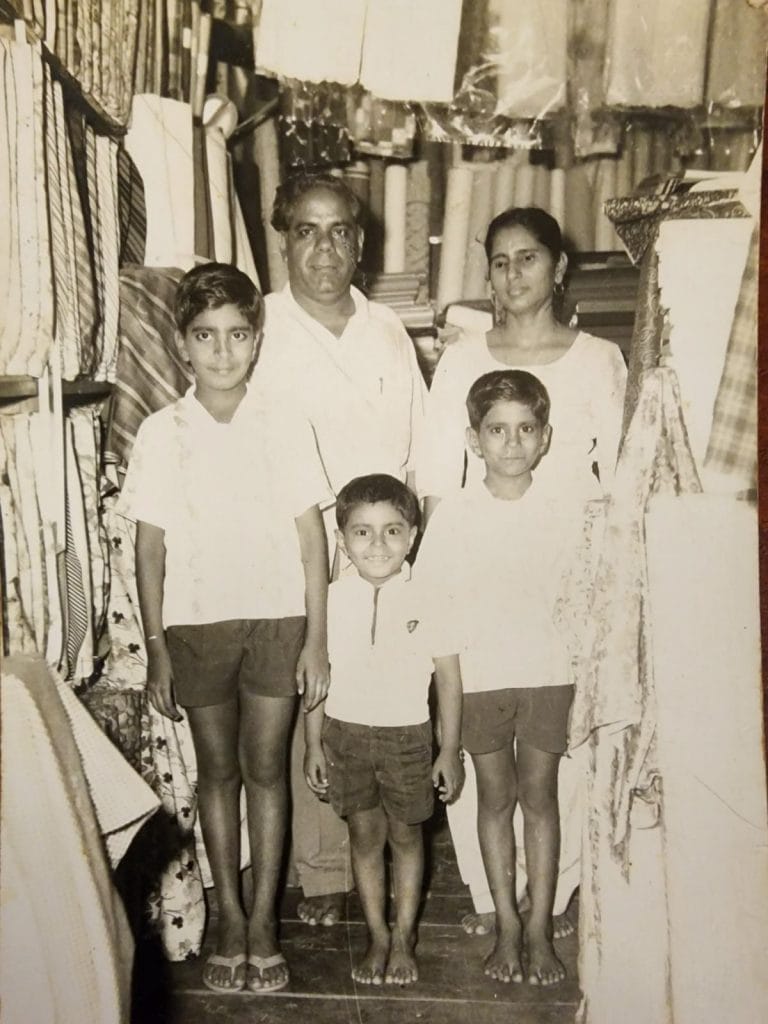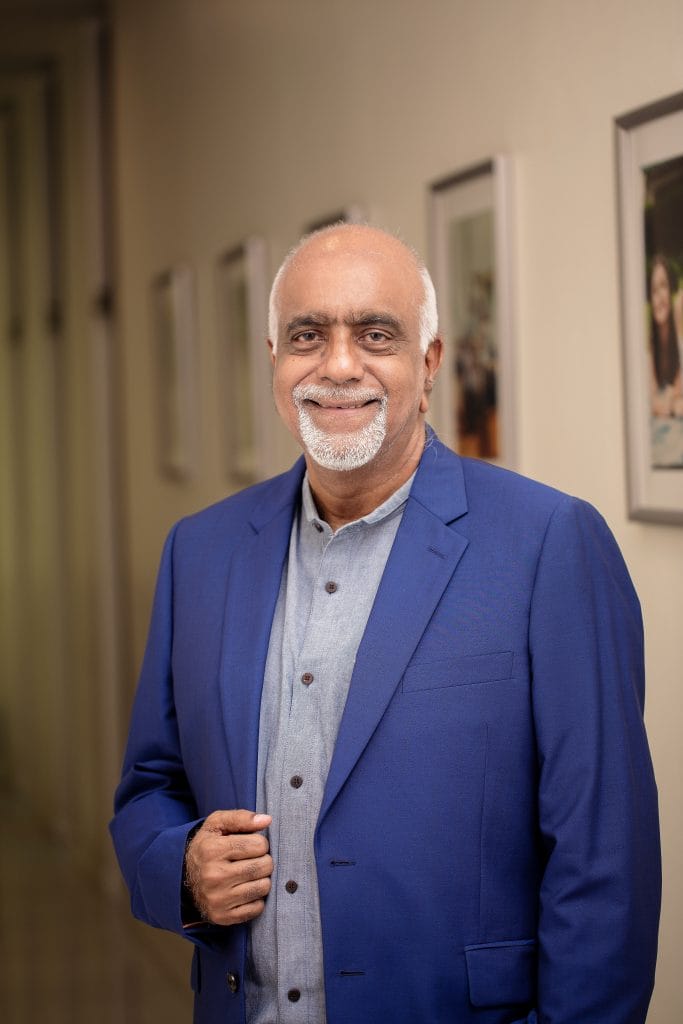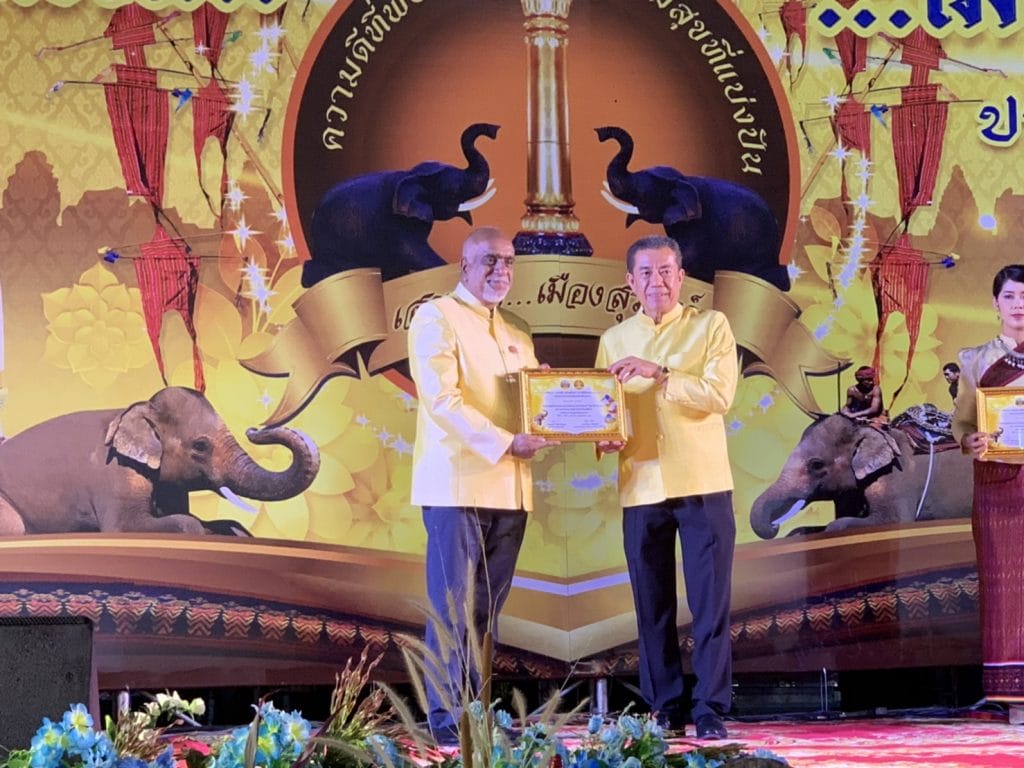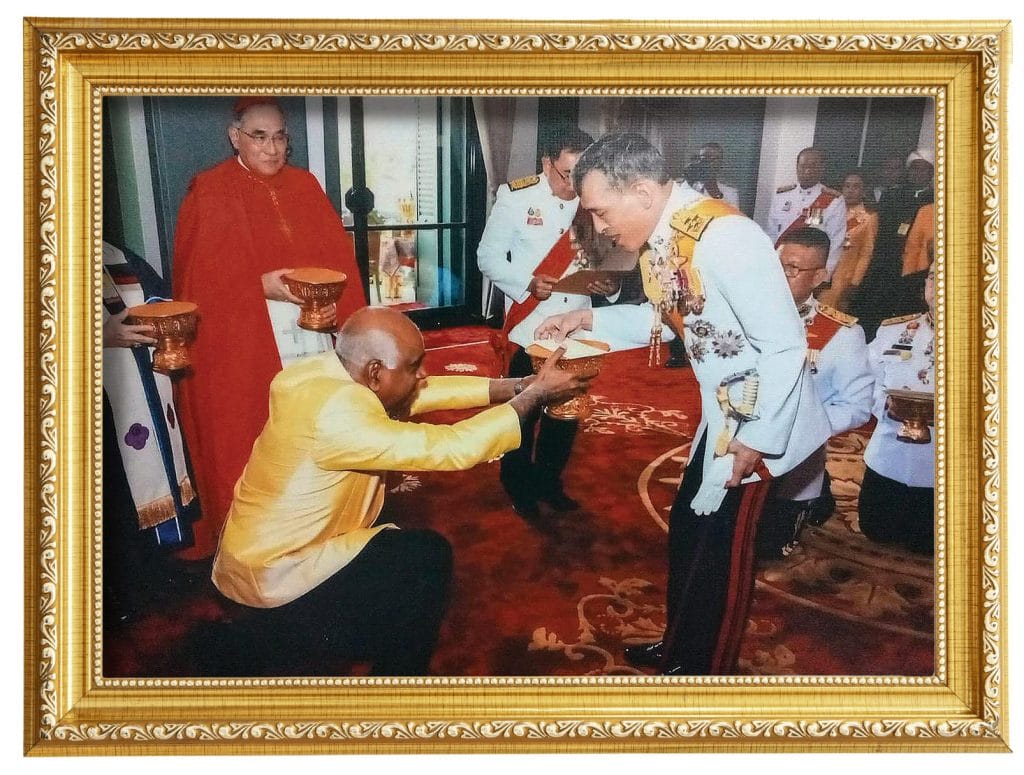How integrity and grit are the fabric of business.
By Aiden Jewelle Gonzales
When I called Sukhit Narula a titan of the fabric business, he politely eschews the claim, which I soon learned is typical of the kind of humility he carries. “I’m a simple man from Isan,” he self-effacingly tells me. “My highest level of education was Class 9. In fact, I came from one of the poorest regions of Thailand, in Surin province.” Nevertheless, although he was born into a middle-income family, the value of hard work was instilled in him from a young age; a family legacy from the days of his grandfather, who came from Gujranwala Gaon, in Punjab. “My grandfather came to Thailand looking for opportunities, shortly followed by my dad after my grandmother passed away,” Sukhit recalls. “Since my dad could not speak Thai, he worked with fellow Punjabis in Bangkok, most of whom were in textiles. He sold the cloth he bought from them all around Bangkok, on his bicycle, and eventually he scrounged together enough money to rent a small shop house in Surin, in the Northeastern part of Thailand. That small ground-floor shop was a labour of love, and I was born and raised in that shop.”
This self-same grit was passed down to Sukhit, who, in a reversal of his father’s journey, came down to Bangkok from Surin to expand his business horizons. Once in Bangkok, he started a slew of businesses in a range of industries – from textiles to manufacturing, real estate, AMC, and mineral water – and now Narula Nonwoven, K.N. Textiles, and the recently-opened Surin Asset Management are stalwarts in their respective industries; successful odes to the power of determination, adaptability, and integrity.
However, this road was neither straight nor easy. “I struggled in Surin City,” Sukhit tells me candidly. “Because I was the eldest, when my parents needed help in the shop to expand the business, I left school when I was 16 to lend a hand. From then on, my dad and I worked together selling whatever we could – from textiles to ready-made garments, blankets, even mosquito nets. But although I learned a lot and strived hard, very few opportunities came my way. By the time I turned 30, my dad and I had co-owned the business for a few years, and I decided it was time that I found my big break. So he gave me THB 1 million in capital and I went down to Bangkok, where my brother-in-law and I started textiles trading.
“We were dealing in polyester, and we were 2nd-tier buyers from importers. We wouldn’t get the cream of the crop; we got what was left over. Because of that, we couldn’t make it work,” Sukhit explains. And this would not be his first failure – something that he’s not only candid about, but that he takes pains to emphasise. “I’ve failed in so many things over the years. I opened a restaurant and that failed; we tried to enter the wood industry and that failed; we did organic produce, and that failed. But I never gave up! We never reached the point where when the market was lost, we lost heart. We always look for new markets,” he says, impassioned, then adds with a laugh, “When the market was bad, we took the opportunity to travel! But perseverance is always key.”
However, as impassioned he is about his business, it’s clear that there’s one thing that comes first: his family. “I wanted my siblings to have all the opportunities I didn’t have,” he reveals to me. “Including the chance to finish their education. I urged them to pursue their higher education if they wished, and made sure that we had the means to support that dream. We’re so fortunate that they all managed to achieve great things in their respective fields – for example, my brother Suresh is a leading cardiologist in Thailand and one of the first Thai-Indians in the field; and my brother Susheel is a renowned banker in Thailand, and lectures in some of the country’s best universities.”
Sukhit’s warm and amiable wife, Manju, who has been listening to our chat with alacrity, chimes in: “And he’s dedicated to his children, too – he’d always take time out to spend quality time with our kids, no matter how busy he was,” she tells me.
“I’m very blessed with my wife,” Sukhit tells me with a smile. “Not just in raising our kids, but in how much of a help she was during those years – at one point, it was just my sister, Beena; my brother-in-law, Pradeep; my wife; and myself working day in and out for a few years.”
When I eagerly ask him to elaborate on what seems to be a proverbially long and hard-won journey from Isan to Bangkok, he obliges me and sits down to give me the history of his businesses, what he believes is the key to success, and his advice to the community borne of years of experience.
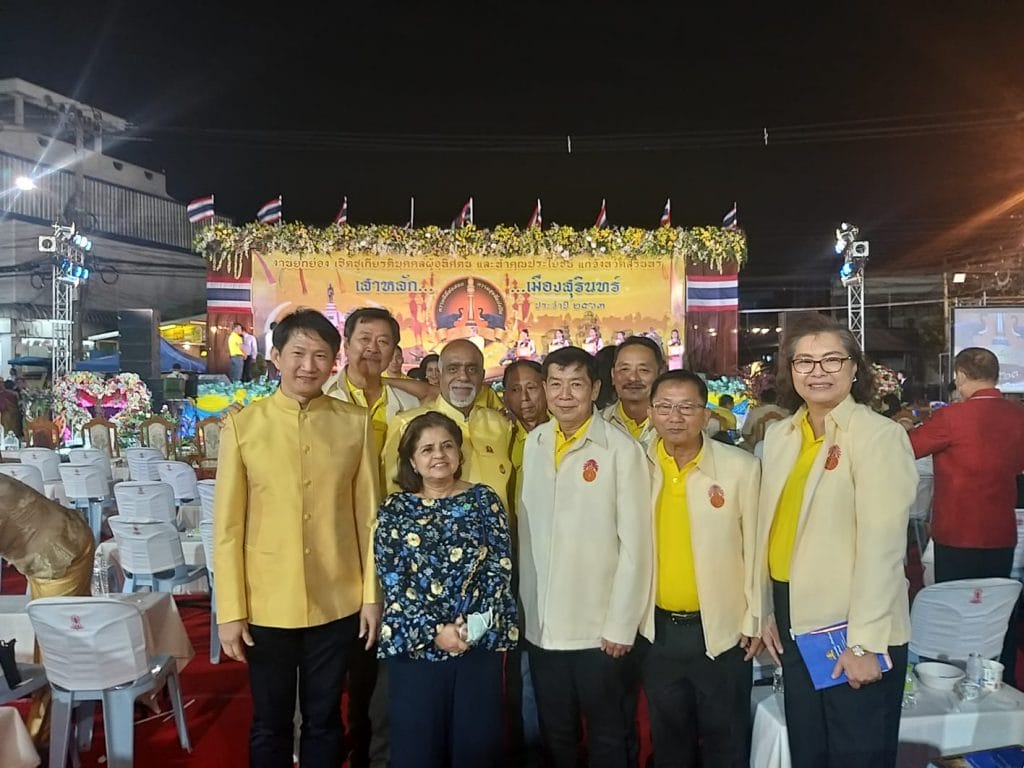
As a self-made man, what challenges did you have to overcome starting your business from scratch, and how did you overcome them?
After our initial venture in Bangkok failed within the first year, I lost my initial capital and that was a huge blow – I even thought about going back to Surin. But I was determined to keep going. It’s truly times like this that you find out who your true friends are.
Fortunately, I had friends I knew from my dealings upcountry. While they didn’t have much to offer, what they had, they gave wholeheartedly. They advised us on the different routes we could take, and we re-evaluated the market. We switched to cotton, which we chose because we could be in direct contact with the factories, so even though we were small, we could move up the scale. Even though we didn’t have the money or the resources, my priority has always been to honour my financial obligations to all my creditors and trading partners, and I’m proud to say, our credit was, and continues to be, top rated.
The first few years, we just had one staff – our delivery boy. We woke up early in the morning, and stayed up late to prepare the goods for the next day. It was a lot of struggle. But slowly, the business grew, and our reputation with it. We diversified, and eventually, we were lucky to get a niche market, which we stumbled upon by chance, and it was a success. Eventually, my brother-in-law and I separated our businesses, each with our own speciality.
What did you decide to focus on once you were on your own?
Manju and I established K.N. Textiles in the early 90s, which is a B2B textile trading company. We diversified and did whatever we could in the competitive textile industry, although our main aim then and even now is to source whatever goods we can from Thailand. Our priority is to support local businesses. I’m so blessed that I had Manju with me during those years as she looked after our accounts, and it was her uncompromising approach to our finances that allowed us to grow. It took years of tireless determination and hard work before we finally understood exactly how to fill the gaps in the market.
In 2006, we expanded to a new market that we thought had a lot of potential – nonwoven products, specifically spunbond. It’s a product that’s used in a variety of industries such as automotives, packaging, agriculture, and medical masks. We followed our intuition, and invested time and capital to establish ourselves in this industry.
We did this for many years, but a problem we had was that although the cheapest source was from China, the price fluctuated a lot. And in our experience, when the market was good, the quality dropped, and this was unacceptable, as we’re very quality-conscious in all our products. So eventually, having seen the rapid rise in demand for the product, we opened Narula Nonwoven in 2008, a spunbond manufacturing plant. A vanguard in its field, it was the first of its kind to cater to the Thai market, and although we started with just a single production line, our capacity grew from 240 tons to 1800 tons a month, and I’m honoured to say that we are among the top nonwoven manufacturers in the region.
You mentioned that spunbond is used in medical masks – is that what you focus on? What was your experience during the COVID-19 pandemic, when the demand for masks rose exponentially?
Pre-COVID, surgical masks comprised about 5 percent of our capacity. During the pandemic, it went up to 20 percent! The problem is that with medical masks, the outer two layers are spunbond, but the middle filter called meltblown fabric, which is the important layer that filters viruses and bacteria, was imported from China. In 2020, they upped their prices from USD 3-4 per kilogram, to more than USD 100 per kilogram. Even Chinese spunbond’s prices doubled! Because of that, we decided to produce our own meltblown fabric – and we didn’t raise our prices for either of the materials. We could have made a killing, but we agreed as a family that it would be unethical to take advantage of those times. All we did was increase our capacity to meet demand.
Integrity and ethics are at the core of who we are as a company. For example, we have a policy not to compete with our customers, so during the COVID period, while masks were selling like crazy and we could have imported mask-making machines to make our own masks instead of just selling the materials to our customers, we decided not to. We did, however, during this severe time of shortage, fly in a mask-producing unit from Taiwan. We ran it for six months but didn’t sell a single piece. All masks from our unit were donated, and we decommissioned the machine when the shortage eased.
Aside from the success of Narula Nonwoven and K.N. Textiles, you’ve also recently started Surin Asset Management, an Asset Management Company (AMC). In laymen’s terms, what do you do, and what drew you to the industry?
We just got the license this year. It’s an extremely difficult license to get; we had to apply to the Bank of Thailand which has very stringent rules, and it took us years. They require complete transparency – and rightly so. We appreciate it, because we want to show that we’re honest in everything we do.
Basically, an AMC buys distressed assets, or Non-Performing Loans (NPLs), from financial institutions. Our mandate is to rehabilitate or restructure defaulted operators into profitability.
I wanted to enter this industry because I’ve had bad experiences with lending money out, as I’m sure a lot of well-to-do Thai-Indians have experienced. I don’t want to carry on this tradition – I think this should be done officially, with a permit. We chose this license, which is harder to get than leasing, because we get uneasy confiscating collateral in the more traditional loan practice. This way, while we’re making good gains, we’re also helping others.
You’ve got your finger in many pies. Can you give us a rundown of your other entrepreneurial ventures, and how those came about? How do you manage them all?
Although most of my peers buy property and hotels in Sukhumvit, which has proven to be very successful, my land acquisitions have been in areas outside of Central Bangkok, and in upcountry. We’ve only recently looked into development projects.
I’m lucky because my sons help me manage everything. My eldest two, Kamol and Amorn, have joined Manju and me in business, and my youngest Anirudh is currently doing his Master’s, and will hopefully join us in a couple of years. Amorn is managing K.N. Textiles while Kamol is managing Narula Nonwoven, and I look after Surin Asset Management.
Aside from business, I’ve heard that you’re someone who feels strongly about giving back to the community, and one of the ways you did that was as the former president of The Hindu Samaj, Dev Mandir. What was your focus during your tenure, and what did you feel were your biggest achievements during that time?
Yes, I personally consider it an obligation to give back to those who are less privileged, especially if you yourself are blessed with financial stability. People, especially children of wealthy parents, often don’t realise their privilege and that’s sad. I was afraid of this for my sons, so during their school holidays, I’d send them to the temples upcountry to where they had the opportunity to learn about the basics of Buddhism, and during which they were forced to adjust and live without the comforts of home.
That was one of the things that we tried to instil when I was president of the Hindu Samaj – reaching out to the youth and getting them back in touch with their spiritual side. And it was hard, as it’s not just the youth, but the parents too! We encouraged the preaching to be done in Thai and English, and we organised activities outside the temples that involved the younger generations.
We also celebrated the 50th Anniversary of Hindu Samaj during my tenure, and it was very successful. We made it simple and tried to involve everyone; nothing for show, just a way to help people come together. Another achievement that we were blessed with was cultivating a great rapport with the government’s Department of Cultural and Religious Affairs. Prior to that, there was not much rapport between our society and theirs.
The Department of Cultural and Religious Affairs wanted to submit my name as Person of the Year for the Department while I was president, but I respectfully declined as they wanted me to write out all the things I had done, and I’m not the person to keep note of my charity work – or even remember! Nevertheless, it was truly an honour that they offered, and I’m so happy because of that.
Another way that you’re contributing to the community is as the president of Grand Royal Nichasol, which has many of the Thai-Indian community living in it. What are the ways that you’ve handled community requests over the years, and what would your advice be to someone in the same position?
We have about 160 houses, and around half are Thai-Indian. One of the things I’m proud to say is that we have achieved unity between the two groups; our members are very compatible, and I think we could be a good example for these communities living together in harmony. My advice would be to look at complaints from their point of view, not your own, and find a middle ground where compromise is met.
What do you attribute your success to, and which successes over the years are you most grateful for?
I would say that the major reason for our success is because of our sincerity to our customers. Our customer base of almost 1,000 has grown through word of mouth because they know we are reliable. We’re proud to be in the position where customers can trust us to fulfil their needs. Of course, I use ‘our’ not ‘my’ because my success is not only mine. It’s only been through God’s grace and our incredible and dedicated staff, all of whom we consider family.
One achievement that I was truly humbled to receive was the Pillar of Surin award from Surin province a few years back, but what I’m truly most grateful for is my wonderful family – my mother, siblings and their families, my wife, sons, daughters-in-law, and my three beautiful grandchildren. We’ve supported each other through thick and thin and none of my achievements would be possible without them.
What new horizons do you hope to explore in the future both personally and professionally?
My passion is the environment. I love to travel and go on nature walks, and I always take a bag with me to collect the trash! I’d like my legacy to be for the environment. I want to commercialise a biodegradable alternative to plastic, that is competitively priced and is not on the human food chain, so it won’t affect human consumption. I’ve been working on this for many years, and my family shares my passion. I’m not sure what the future holds, but I see my role now more as a mentor to my children. I encourage them to be creative, take calculated risks, make decisions, and not to be afraid of making mistakes.
What message do you want to give to the community of Thai-Indians?
Take risks but first, do your homework. Find a niche market that you can do better than others, and go for it. Don’t give up! I’ve had many failures over the years, but I’ve picked myself up each time, and it’s served me well. Often, there’s a lack of determination or willpower to overcome difficult things, and people often choose the easy way out. I’ve had people say to me, “we can’t fight China,” and I said, “if you have that mentality, you’ve already lost. You can ‘fight’ anyone. Find your strength and their weakness. Even a giant has their weakness, and everyone has a strength.”
Finally, find your focus, and give your all to your customers. Their criticisms will help you grow and better understand the market, and through this, you can be the best at what you do.



